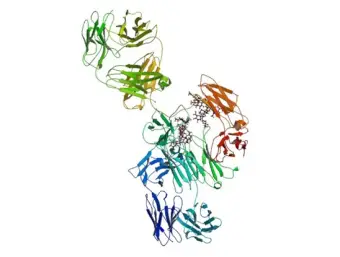Anakinra API Manufacturers & Suppliers
Find, compare & contact
Filters
Custom request?
Type
Production region
Qualifications
Country of origin
Producer
Produced in:
Established in: 2019
MOQ: 1 g
Employees: 10+

Focused on pharmaceutical industry

Reasonable price for the customers

Full service from R&D stage to commercial stage
+ 0
All certificates
How does it work?
You can register for free as long as you are registering on behalf of a legal company related to the pharmaceutical industry
Search in the search bar the product that you’re looking for. We’ll show you an overview of all available suppliers. Use the filters to select the relevant suppliers only
Have you found interesting suppliers? Then it’s time to contact them. Use the send inquiry button and send them a message. You can send for each product, 3 inquiries per week
Suppliers get notified by Pharmaoffer that they’ve received a new inquiry. They will come back to you with their questions, certificates, and offer in the chat on Pharmaoffer. We will send you an email in case of any news
Does the supplier meet your quality and commercial requirements? Then you can place the order. Just follow the steps of our order module
Looking for Anakinra API 143090-92-0?
- Description:
- Here you will find a list of producers, manufacturers and distributors of Anakinra. You can filter on certificates such as GMP, FDA, CEP, Written Confirmation and more. Send inquiries for free and get in direct contact with the supplier of your choice.
- API | Excipient name:
- Anakinra
- Synonyms:
- ICIL-1RA , IL-1ra , IL-1RN , IL1 inhibitor , IRAP
- Cas Number:
- 143090-92-0
- DrugBank number:
- DB00026
- Unique Ingredient Identifier:
- 9013DUQ28K
About Anakinra
It's time for some technical information for the ones who understand chemistry: Anakinra is a recombinant, nonglycosylated human interleukin-1 receptor antagonist (IL-1Ra). The difference between anakinra and the native human IL-1Ra is that anakinra has an extra methionine residue at the amino terminus. It is manufactured by using the E. coli expression system. Anakinra is composed of 153 amino acid residues. FDA approved on November 14, 2001.
You can find more info about this product by clicking on the DB ID above.
Anakinra is a type of Interleukin inhibitors
Interleukin inhibitors are a crucial subcategory of pharmaceutical active pharmaceutical ingredients (APIs) that play a significant role in the treatment of various inflammatory diseases. Interleukins are proteins produced by immune cells and act as chemical messengers in the immune system, regulating immune responses and inflammation. However, when these interleukins become overactive or dysregulated, they can contribute to chronic inflammatory conditions.
Interleukin inhibitors work by targeting specific interleukins and blocking their activity, thereby reducing inflammation and alleviating associated symptoms. These inhibitors are designed to selectively bind to interleukins or their receptors, preventing them from initiating inflammatory responses. By inhibiting interleukins, these APIs can effectively modulate immune system activity and suppress inflammation.
The development of interleukin inhibitors has revolutionized the treatment landscape for various inflammatory diseases, including rheumatoid arthritis, psoriasis, and inflammatory bowel disease. These APIs have demonstrated remarkable efficacy in clinical trials, offering patients improved disease management and enhanced quality of life.
The use of interleukin inhibitors as pharmaceutical APIs is based on extensive research and understanding of the complex mechanisms underlying inflammatory diseases. Pharmaceutical companies are continuously investing in research and development to discover novel interleukin inhibitors with enhanced specificity and potency.
In conclusion, interleukin inhibitors are a vital class of pharmaceutical APIs that effectively target and modulate the activity of interleukins, providing a powerful therapeutic approach for managing inflammatory diseases.
Anakinra (Interleukin inhibitors), classified under Immunomodulators
Immunomodulators, a category of pharmaceutical active pharmaceutical ingredients (APIs), are substances that help regulate and modify the immune response of an individual. These compounds play a crucial role in treating various immune-related disorders and diseases. Immunomodulators work by either enhancing or suppressing the immune system, depending on the specific condition being treated.
Immunomodulators are used in the treatment of autoimmune disorders, such as rheumatoid arthritis, multiple sclerosis, and psoriasis. By suppressing the immune system, these APIs help reduce the overactive immune response associated with these conditions, thereby alleviating symptoms and preventing further damage to the body's tissues.
On the other hand, immunomodulators are also employed to boost the immune system in cases of immunodeficiency disorders. These APIs stimulate the immune response, enabling the body to better fight off infections and diseases. Additionally, immunomodulators are utilized in the prevention and treatment of organ transplant rejection, where they help modulate the immune system to accept the transplanted organ.
The development and production of immunomodulators require rigorous testing and quality control to ensure their safety and efficacy. Pharmaceutical companies carefully formulate these APIs into various dosage forms, including tablets, capsules, injections, and topical preparations, to cater to different patient needs.
In summary, immunomodulators form a vital category of pharmaceutical APIs that regulate and modify the immune system. With their ability to modulate immune responses, these compounds contribute significantly to the management and treatment of various immune-related disorders and diseases, improving the quality of life for many patients.
Anakinra manufacturers | traders | suppliers
We have 1 companies offering Anakinra produced in 0 different countries.
Get in contact with the supplier of your choice:
- Apino Pharma Co., Ltd. from China, product country of origin China
Let the supplier know whether you are looking for a product with a specific monograph such as EP (Ph. Eur.), USP, JP, BP or another quality. Or, whether you are looking for hydrochloride (HCl), anhydricum, base, micronisatum or a specific purity.
You can use the filters to find high-quality suppliers. For example, you can select GMP, FDA or ISO certified suppliers. Visit our FAQ page or use the chat box in the corner to get more information about Pharmaoffer.









